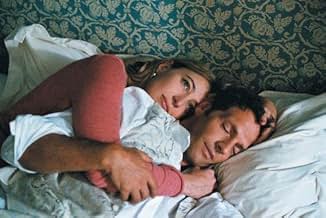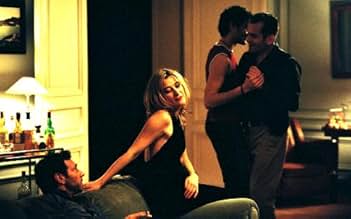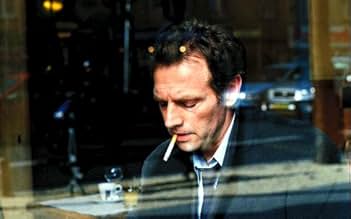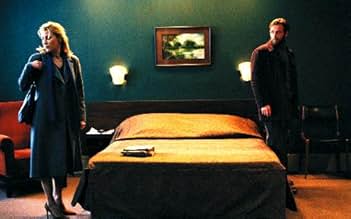ÉVALUATION IMDb
6,6/10
11 k
MA NOTE
Cinq étapes dans la romance entre une femme et un homme.Cinq étapes dans la romance entre une femme et un homme.Cinq étapes dans la romance entre une femme et un homme.
- Director
- Writers
- Stars
- Prix
- 1 victoire et 2 nominations au total
Valeria Bruni Tedeschi
- Marion
- (as Valeria Bruni-Tedeschi)
Ninon Brétécher
- Sophie
- (as Ninon Bretecher)
Avis en vedette
This film is about 5 segments of the relationship between Gilles and Marion in reverse chronological order.
I thought the reverse chronological order would make it as confusing as "Memento", but actually it is very simple to understand. The film highlights 5 different time segments that is pivotal to the relationship. What happens in between the segments is not mentioned. It leaves the viewers much room for imagination and interpretation.
It is a story about real human beings. No one is flawless. The carnal desire of Gilles, and his shameless expression of it, destroys his love life. Valerie's passionless attitude and negativity destroys her relationship. Marion, on the other hand, gets repeatedly disappointed with life. Everything in the film is so real and close to us, unlike most films that portray fairytale couples or unrealistic lives.
I particularly like the childbirth segment, as emotions are well portrayed and affecting. I think this film is good, but not as groundbreaking as I expected it to be.
I thought the reverse chronological order would make it as confusing as "Memento", but actually it is very simple to understand. The film highlights 5 different time segments that is pivotal to the relationship. What happens in between the segments is not mentioned. It leaves the viewers much room for imagination and interpretation.
It is a story about real human beings. No one is flawless. The carnal desire of Gilles, and his shameless expression of it, destroys his love life. Valerie's passionless attitude and negativity destroys her relationship. Marion, on the other hand, gets repeatedly disappointed with life. Everything in the film is so real and close to us, unlike most films that portray fairytale couples or unrealistic lives.
I particularly like the childbirth segment, as emotions are well portrayed and affecting. I think this film is good, but not as groundbreaking as I expected it to be.
"5x2" is not the first film to explore a relationship by going backwards from its end to its beginning (Pinter's "Betrayal" comes to mind let alone the mystery in "Memento").
But writer/director François Ozon, aided by superb acting, uses the structure for a thoughtful and intriguing commentary on love and marriage.
The first scene sets up our curiosity as while a lawyer dryly reads the divorce agreement, letting us know the cold facts of the marriage, there is palpable electricity between the about to be ex-wife and husband such that we are not surprised when they immediately head to a hotel, as it turns out their relationship started in a hotel.
We are introduced to the complexities between this couple as their layers are played out through a sexual encounter that is open to "he said, she said" interpretations that will continue as we flashback to key points in their relationship. The other four incidents show them as parents, at the birth of their child, at their wedding and at their meeting, all played out in relation to her parents' long-time conflicted marriage and his brother's homosexual arrangements, amid other encounters.
Valeria Bruni Tedeschi is so luminous as "Marion" that I'm not sure if it's her beautiful acting, as she is in turn up-tight, conflicted, sensual, fragile or aggressive, or her character who changes or that François Ozon is such a sensitive director of women, as he showed in "Swimming Pool" and "Under the Sand (Sous le sable)", that I favored her character, even if we gradually learn that she may or may not be as much of a victim as it seems and she is as much influenced by physical imperatives as he is. Stéphane Freiss plays virtually the opposite of his caring husband in "Le Grand Rôle," even if it becomes less and less clear he's the S.O.B. he at first could appear to be, or if his character experiences any changes or learns anything through serial somewhat monogamy, especially because some details in their past are just left mysterious.
The film is certainly not optimistic about love being an effective basis for a man and a woman to sustain a long term relationship and it leaves open-ended for a gendered discussion about whether that applies to the particulars of these individuals, or to them as French or as Europeans, vs. universals, as Americans would probably interpret their interactions differently than other audiences.
Certainly, in a frankly sexually mature film it's nice to see non-Hollywood bodies, of a zaftig woman and a guy without a personal trainer credit listed.
The frequent use of Paolo Conte songs on the soundtrack add to the ironic feeling surrounding the film, even if the lyrics aren't translated in the many white-on-white subtitles.
Going off into the sunset, and the cinematography and production design, from dark to light, throughout are lovely, hasn't had such an ironic conclusion since the original "Planet of the Apes."
But writer/director François Ozon, aided by superb acting, uses the structure for a thoughtful and intriguing commentary on love and marriage.
The first scene sets up our curiosity as while a lawyer dryly reads the divorce agreement, letting us know the cold facts of the marriage, there is palpable electricity between the about to be ex-wife and husband such that we are not surprised when they immediately head to a hotel, as it turns out their relationship started in a hotel.
We are introduced to the complexities between this couple as their layers are played out through a sexual encounter that is open to "he said, she said" interpretations that will continue as we flashback to key points in their relationship. The other four incidents show them as parents, at the birth of their child, at their wedding and at their meeting, all played out in relation to her parents' long-time conflicted marriage and his brother's homosexual arrangements, amid other encounters.
Valeria Bruni Tedeschi is so luminous as "Marion" that I'm not sure if it's her beautiful acting, as she is in turn up-tight, conflicted, sensual, fragile or aggressive, or her character who changes or that François Ozon is such a sensitive director of women, as he showed in "Swimming Pool" and "Under the Sand (Sous le sable)", that I favored her character, even if we gradually learn that she may or may not be as much of a victim as it seems and she is as much influenced by physical imperatives as he is. Stéphane Freiss plays virtually the opposite of his caring husband in "Le Grand Rôle," even if it becomes less and less clear he's the S.O.B. he at first could appear to be, or if his character experiences any changes or learns anything through serial somewhat monogamy, especially because some details in their past are just left mysterious.
The film is certainly not optimistic about love being an effective basis for a man and a woman to sustain a long term relationship and it leaves open-ended for a gendered discussion about whether that applies to the particulars of these individuals, or to them as French or as Europeans, vs. universals, as Americans would probably interpret their interactions differently than other audiences.
Certainly, in a frankly sexually mature film it's nice to see non-Hollywood bodies, of a zaftig woman and a guy without a personal trainer credit listed.
The frequent use of Paolo Conte songs on the soundtrack add to the ironic feeling surrounding the film, even if the lyrics aren't translated in the many white-on-white subtitles.
Going off into the sunset, and the cinematography and production design, from dark to light, throughout are lovely, hasn't had such an ironic conclusion since the original "Planet of the Apes."
A film that suggests a cross between Bergmans's gut-wrenching "Scenes From a Marriage" (1973) and Stanley Donen's more lighthearted "Two For the Road" (1967), mixed in a bit with that backwards "Seinfeld" episode, "5X2" (2005) is a very fine adult drama from director Francois Ozon. As the title suggests, it is comprised of five short glimpses at the doomed relationship of a handsome professional couple, Marion (Valeria Bruni-Tedeschi) and Gilles (Stephane Freiss). As in "Two For the Road," we see unchronological snapshots of this couple's failing marriage, but unlike the '67 film, rather than being given scattershot scenes from various periods, here we proceed continuously backward in time: from the divorce settlement and its rather icky aftermath, backward to one of the couple's dinner parties, back still to the birth of their premature son, on to their wedding party (and a most unusual wedding night, to put it mildly), and all the way back to one of their first meetings. Our foreknowledge that the couple's marriage is doomed makes the cracks in Marion and Gilles' relationship stand out all the clearer. Consequently, the pretty, upbeat ending is rendered bittersweet at best, with our preglimpse of what their future holds. "5X2" has been finely put together and features sterling acting down to the smallest bit players. It was especially great for me seeing that grand old actor, Michael Lonsdale (who will always be Hugo Drax for us Bond fanatics), still acting at age 74, here playing Marion's father. My only complaint, really, concerning "5X2" is that it is a bit on the short and sketchy side; perhaps a few extra scenes would have enabled us to more fully understand the characters' motivations, particularly Gilles' (and especially his no-show at his son's birth). This, for me, is the only thing that prevents "5X2" from being a perfect 10.
At 5x2 we see the course of a relationship from end to beginning. The reverse chronology of events is now a well established editing technique which almost always works and intrigues the viewer.
The personalities of both Marion and Gilles are established fairly quickly, but the reasoning behind their actions is usually explained at a later time. In fact, this shows how well written 5x2 is, because throughout all five episodes the characters of the protagonists don't change, their behavior has changed due to actions of the other part.
Both actors deliver high caliber performances and their faces write perfectly on the screen. They do create a chemistry when needed (and a lack of again when needed). Can you believe by the way that beautiful Valeria Bruni is forty years old?
The vintage Italian music adds color to the story and Ozon shows he is an accomplished director. As the movie ends he gives us one of the most idyllic scenes ever filmed.
The personalities of both Marion and Gilles are established fairly quickly, but the reasoning behind their actions is usually explained at a later time. In fact, this shows how well written 5x2 is, because throughout all five episodes the characters of the protagonists don't change, their behavior has changed due to actions of the other part.
Both actors deliver high caliber performances and their faces write perfectly on the screen. They do create a chemistry when needed (and a lack of again when needed). Can you believe by the way that beautiful Valeria Bruni is forty years old?
The vintage Italian music adds color to the story and Ozon shows he is an accomplished director. As the movie ends he gives us one of the most idyllic scenes ever filmed.
5x2 comes as a slight let-down following director Francois Ozon's recent critical and commercial success with Swimming Pool.Ozon's decision to structure the film in an anti-linear fashion is nothing original and he himself admits he was influenced by Jane Campion's little-known TV film Two Friends (1985) which used the same structure. Ozon chooses 5 crucial scenes from the life of Marion and Gilles, a middle-class couple with a son, Nicholas, whose married life quickly disintegrates into divorce. Ozon begins with the austere divorce, finishing with the moment this would-be-couple met.
The reverse structure allows the viewer to consider what went wrong and decipher why the marriage ended so bitterly. It is fairly obvious the reasons why they divorced, but Ozon and his frequent collaborator, Emmanuelle Bernhein, are as interested in the psychological worlds of these two people as their mundane reality.
The film works for the most part, but some scenes are unbelievable: Gilles's boastful confession at the party with his brother; the scene in the woods with Marion and an American tourist. These scenes undermine the subtle nature Ozon employs elsewhere. He explains too much, which isn't his style. A better edit would have made this an even better film.
As for the music, the corny 1960's Italian love songs used to close each segment are plain awful. The triviality of the songs might offer an ironic counterbalance to what is happening on screen, but the effect is of a sneering, sardonic detachment on behalf of the director. It's as if Ozon wants to dismiss every aspect of romantic culture as a fallacy.The best musical segment is at the end where Ozon's longtime composer Philippe Rombi returns some panache to the film's audio sensibilities. Special mention should go to Paolo Conte's haunting Sparring Partner which is used in the dinner scene and in the final credits.
The acting is excellent,and the closing frame is a masterstroke.But it doesn't merit that many repeat viewings as his earlier Swimming Pool did.
The reverse structure allows the viewer to consider what went wrong and decipher why the marriage ended so bitterly. It is fairly obvious the reasons why they divorced, but Ozon and his frequent collaborator, Emmanuelle Bernhein, are as interested in the psychological worlds of these two people as their mundane reality.
The film works for the most part, but some scenes are unbelievable: Gilles's boastful confession at the party with his brother; the scene in the woods with Marion and an American tourist. These scenes undermine the subtle nature Ozon employs elsewhere. He explains too much, which isn't his style. A better edit would have made this an even better film.
As for the music, the corny 1960's Italian love songs used to close each segment are plain awful. The triviality of the songs might offer an ironic counterbalance to what is happening on screen, but the effect is of a sneering, sardonic detachment on behalf of the director. It's as if Ozon wants to dismiss every aspect of romantic culture as a fallacy.The best musical segment is at the end where Ozon's longtime composer Philippe Rombi returns some panache to the film's audio sensibilities. Special mention should go to Paolo Conte's haunting Sparring Partner which is used in the dinner scene and in the final credits.
The acting is excellent,and the closing frame is a masterstroke.But it doesn't merit that many repeat viewings as his earlier Swimming Pool did.
Le saviez-vous
- AnecdotesIn the French edition of the DVD, the director offers a version of the movie titled "2 x 5". This version shows the five sequences in the chronological order, from the moment the couple meets till their divorce. Subtle editing work has been applied to make the movie work.
- GaffesThe scene where the American came to Marion during the wedding night and introduced himself who arrived in France today and would leave tomorrow for LA. Who would just do that? It's just lame.
(Answer: someone not coming from the USA, for instance.)
Meilleurs choix
Connectez-vous pour évaluer et surveiller les recommandations personnalisées
- How long is Five Times Two?Propulsé par Alexa
Détails
- Date de sortie
- Pays d’origine
- Sites officiels
- Langues
- Aussi connu sous le nom de
- 5 x 2 - Cinq fois deux
- Lieux de tournage
- sociétés de production
- Consultez plus de crédits d'entreprise sur IMDbPro
Box-office
- Budget
- 5 250 784 € (estimation)
- Brut – États-Unis et Canada
- 128 752 $ US
- Fin de semaine d'ouverture – États-Unis et Canada
- 15 667 $ US
- 12 juin 2005
- Brut – à l'échelle mondiale
- 7 444 906 $ US
- Durée
- 1h 30m(90 min)
- Mixage
- Rapport de forme
- 1.85 : 1
Contribuer à cette page
Suggérer une modification ou ajouter du contenu manquant


























